Subjects in brain research who sat facing each other while talking had brains that “lit up” while those who sat back-to-back had much less brain activity, the Institute for PR was told Nov. 30.
|
|
Distinguished IPR Lecturer Geoff Colvin, senior editor-at-large of Fortune, used the results of the experiment to impress on the audience of more than 200 at the Roosevelt Hotel that they need to communicate “F2F” with editors and others for maximum impact.
“Tonight’s dinner, where all of you are talking and communicating with each other, is a good example of what I mean,” he said.
|
|
Recording electrical activity of the brain, called electroencephalography, (EEG) is done with electrodes placed along the scalp. Spontaneous activity is recorded while various activities take place.
“Dialogic Loop” Was Urged
Tina McCorkindale, Ph.D., president and CEO of IPR, which is celebrating its 60th anniversary, expressed strong support for F2F in a 2013 essay in PRSA’s online PR Journal. The essay said a “dialogic loop” is the ideal form of communications for PR people.
Co-authored with Marcia DiStaso, 2014 chair of the PRSA Educators Academy, the article defined dialogic loop as “any negotiated exchange of ideas and opinions.”
“Both parties must be willing to be open and listen to the other parties even if there is a disagreement,” said the 23-page article on “The Use of Social Media in Fortune’s Most Admired Companies.”
Attempts by this reporter to set up a “loop” with either McCorkindale or DiStaso were unsuccessful. None of the other 14 board members of the Educators Academy would respond. Two demanded that we never contact them again.
Oscar Suris of Wells Fargo is IPR chair.
F2F in Decline in PR
While Colvin, McCorkindale and others preach the value of F2F, there has been a decline in such activity in the PR and press communities in New York and elsewhere. F2F PR/press activity is a fraction of what it once was.
Press groups themselves practice press avoidance. The Committee to Protect Journalists, which inveighs against press interference abroad and now says it will fight that in the U.S., won’t let working press sit with corporate guests at its annual dinner. Money isn’t the issue since it has a net worth of $16.5 million. The repeated claims of love of “press freedom” by speakers provoked “tweets” with words such as “hypocrisy,” “cognitive dissonance,” and “laughter” among the attendees.
The New York Financial Writers Assn. had no room for working press at its annual $400 a plate dinner and “Follies” Nov. 11. Reporters could go if they wished to stand at the back of the room, said executive manager Britt Tunick. Bill Egbert of Downtown Express is the elected president.
Press/PR Lunch/Dinner Groups Vanish
PR Society:New York, a mostly corporate group that hosted major speakers each month for more than 50 years, folded in 2013. Coverage of its demise includes details of more than 20 New York PR/press lunch/dinner groups that also bit the dust.
PR/press communication currently is mostly via emails. Corporate/institutional employers keep a strict eye on any dialogue with reporters. With so many other ways to reach customers and potential customers, such as social media and house webs and publications, there is less interest in placing articles in traditional media where the news hole is much smaller than it once was.
Companies are showing a preference for “branded content” which is ads that resemble regular editorial matter. Media including the New York Times, Atlantic magazine, Hearst publications and others are cultivating such business.
Tell Stories, Says Colvin
Colvin said PR people must be alert to the “power of story telling.” That is the best way to capture and hold the interest of desired audiences, he said.
The general public must get in touch with what the public is actually thinking and not what they think the public is supposed to be thinking, he said.
The election of Donald Trump as president and the U.K. vote to leave the Common Market shocked many including the media and showed how out-of-touch with reality media and much of the public are, he added. “Understand the public,” he advised.
Asked what the election of Trump means, Colvin said PR people should check the policies and programs that he is supporting since that is what got him elected.
B-M’s Ford Hits “Coarse” Election
|
|
Patrick Ford, vice chairman and chief client officer, Burson-Marsteller, who received IPR’s Alexander Hamilton Medal, said “One need look no further than the coarse public discourse that characterized the U.S. elections this year, and others around the world, to see that the role of the PR professional is more important today than ever.”
PR people must focus as much or more on behavior as we do on words, he said. “We need to be the driving force we have always striven to be: for truth, authenticity and transparency.”
Ford expressed admiration and gratitude to B-M founder Harold Burson, who was present at the dinner. “Thank you, Harold, for teaching me how to be the best PR practitioner I could be. And for teaching me to be a trusted adviser to our clients, who we both value so highly.”
Hamilton, noted Ford, was “a PR master,” a description given him Allan Nevins, Ph.D., in a 1978 essay in PR Review. Shelley Spector, a founder of the Museum of PR, had pointed that quote out to him. Full text of Ford’s speech is here.
Otto Gets Felton Medal
Charlotte Otto, senior corporate strategist, Weber Shandwick, who was at Procter & Gamble 33 years including 20 in global PA and external relations, was awarded the Jack Felton Medal for lifetime achievement for advancement of research, measurement and evaluation.
William “Ward” White, Milwaukee PR executive and board member of IPR more than 20 years, who died Aug. 9 at the age of 76, was posthumously given the IPR Distinguished Service Award.
Sylvia Jiankun Guo, University of Maryland, was awarded the Grunig PRIME Research Fellowship.
Michael Vafeiadis, Penn State University, was given the Don Bartholomew Award for Excellence in PR Research.
Dejan Vercic, Ph.D., professor and head of Centre for Marketing & PR, University of Ljubljana, was given the Pathfinder Award.

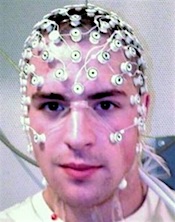
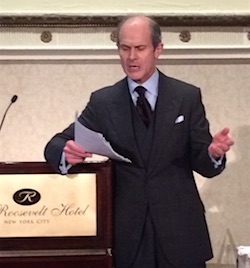
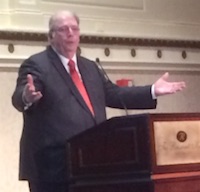

 Trump Media & Technology Group today reported a $58.2M net loss on $4.1M in 2023 revenues, a disclosure that drove its stock price down 22.6 percent to $47.96.
Trump Media & Technology Group today reported a $58.2M net loss on $4.1M in 2023 revenues, a disclosure that drove its stock price down 22.6 percent to $47.96.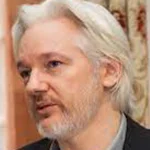 Barry Pollack, an attorney at Wall Street’s Harris St. Laurent & Wechsler, has registered Julian Assange as a client with the Justice Dept. “out of an abundance of caution.”
Barry Pollack, an attorney at Wall Street’s Harris St. Laurent & Wechsler, has registered Julian Assange as a client with the Justice Dept. “out of an abundance of caution.”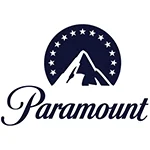 Paramount Global to slash 800 jobs in what chief executive Bob Bakish calls part of an effort to “return the company to earnings growth"... Rolling Stone editor-in-chief Noah Shachtman is exiting at the end of the month due to disagreements with chief executive Gus Wenner over the direction the magazine is taking... The New York Times broke the $1 billion barrier in annual revenue from digital subscriptions in 2023... Press Forward is investing more than $500 million to strengthen local newsrooms.
Paramount Global to slash 800 jobs in what chief executive Bob Bakish calls part of an effort to “return the company to earnings growth"... Rolling Stone editor-in-chief Noah Shachtman is exiting at the end of the month due to disagreements with chief executive Gus Wenner over the direction the magazine is taking... The New York Times broke the $1 billion barrier in annual revenue from digital subscriptions in 2023... Press Forward is investing more than $500 million to strengthen local newsrooms.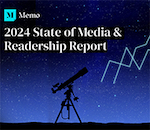 The majority of news articles are read within the first three days of publication, according to a recent report.
The majority of news articles are read within the first three days of publication, according to a recent report.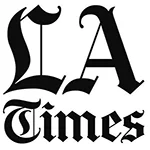 The Los Angeles Times gives pink slips to 115 people or 20 percent of its newsroom staff... TIME is also laying off about 30 employees, which is approximately 15 percent of its editorial staff... The Baltimore Banner, which was launched by Stewart Bainum in 2022 after he failed to buy the Baltimore Sun, added 500 subscribers per day in the three days following Sinclair Broadcast Group's deal to purchase the Sun.
The Los Angeles Times gives pink slips to 115 people or 20 percent of its newsroom staff... TIME is also laying off about 30 employees, which is approximately 15 percent of its editorial staff... The Baltimore Banner, which was launched by Stewart Bainum in 2022 after he failed to buy the Baltimore Sun, added 500 subscribers per day in the three days following Sinclair Broadcast Group's deal to purchase the Sun.


 Have a comment? Send it to
Have a comment? Send it to 
No comments have been submitted for this story yet.